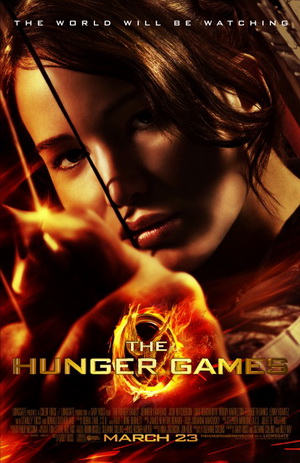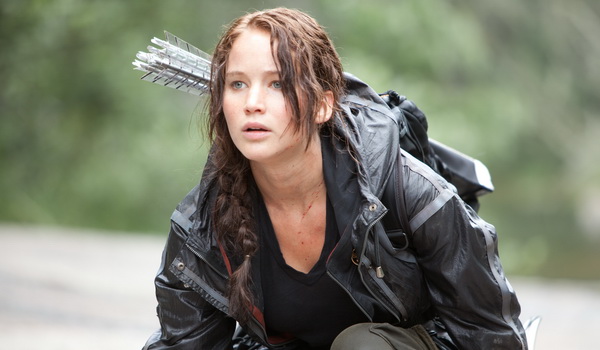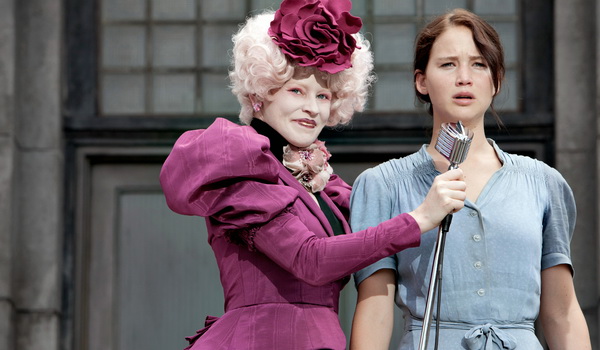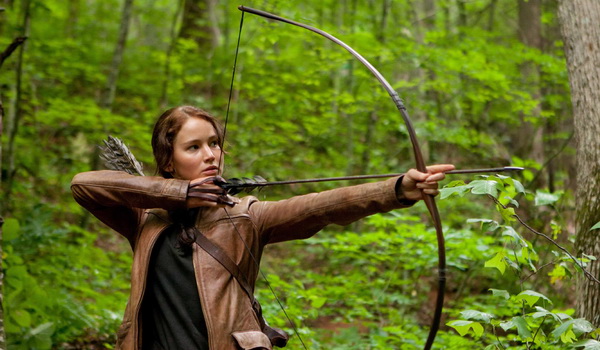- Title: The Hunger Games
- IMDB: link

 Long before the young adult novel by Suzanne Collins on which The Hunger Games is based, Hollywood has enjoyed the idea of a culture putting murder on display as reality television for the enjoyment of the masses. From the enjoyable The Running Man to the deplorable The Condemned the results have been mixed.
Long before the young adult novel by Suzanne Collins on which The Hunger Games is based, Hollywood has enjoyed the idea of a culture putting murder on display as reality television for the enjoyment of the masses. From the enjoyable The Running Man to the deplorable The Condemned the results have been mixed.
And we’re not even going to get started on the dozens of gladiator and horror movies that use some version of the tale as well. Originality is not this film’s strong suit. And with a running time of 142 minutes neither is brevity.
The Hunger Games gives us a world in which the twelve poor outlying districts attempted to rise up against the rich capital state 74 years ago only to be thwarted and beaten back down. Now, in memory of the events and to keep the populace in line, one male and one female between the ages of 12 and 18 are chosen by lottery to kill each other on live television in “The Hunger Games,” with as much pomp and circumstance as they can muster. Murder, of and by children, it seems is to be the sport of the future.
Despite giving us this Cliff’s Notes history twice in the film’s opening 15-minutes, we’re never given any detail as to what caused the riots, what happened to the those who organized them, or how the the immediate fallout of the situation effectively changed this world. Instead we jump 74 years into future for the first time the games are truly tested (well, kind of tested I guess) by a spunky young girl from the furthermost district.
The story is told through the eyes of Katniss Everdeen (Jennifer Lawrence) who volunteers for tribute to save her younger sister (Willow Shields) from taking part. Most of the first-half of the film deals with Katniss and and Peeta (Josh Hutcherson), the other tribute from her district, getting whisked away to the capital, wined, dined, trained for combat, and treated as celebrities by those who will bet on their deaths in less than two weeks time.
The nihilistic future meant to shine a mirror on current culture is a mixed success at best. Lawrence is fine in the lead role, but she’s not really challenged other than to be concerned, scared, exhausted, or brave, as the situation calls for.

For a hugely successfully movie (the film opened to one of the biggest opening weekends ever) I’m guessing most people who go straight home to watch The Amazing Race, The Bachelor, and Fear Factor are going to completely miss the irony. Although it certainly has the opportunity to make a statement about reality-television and how it degrades those involved through the shimmer of pseudo-celebrity the film pulls most of its punches, quite possibly to not offend those who will make the connection. In fact one could argue it celebrates the process at least as much as it attempts to condemn it.
The games themselves aren’t really the villains. Instead The Hunger Games casts the wealthiest citizens of the capital city, the upper 1% if you will, as the true villains of the piece. However, here too the film is more concerned with ridiculous futuristic fashion (Elizabeth Banks and Stanley Tucci get the worst of it) rather than actually dealing with the politics of class warfare it brings up but has no real intention of addressing in any serious way – even when our spunky young heroine kinda, sorta, but not really, challenges the status quo.

And for a film about kids brutally killing each other, the film (not surprisingly) is rather bloodless. Aside from a pair of scenes where the vast majority of tributes are killed early on there’s not actually a lot of killing in a movie that’s promoted completely around the concept. In fact our heroine really only purposefully kills one person, and only in self-defense, preferring to spend most of her time tied to a tree.
Also troubling are severe changes to the game makes on the fly that make little to no sense except to get the characters the author cares most deeply about to the final round. There’s no doubt, not for an instant, who is going to survive and the attempts to change the rules 74 years into the concept on the fly “just because” come off as amateurish at best. It would be like changing the rules of the Super Bowl this year at halftime for no other reason than it would help one team’s chances of winning.

The Hunger Games isn’t awful, but it is deeply flawed. I have no doubt reading the source material beforehand may have filled in some of the gaps that don’t quite make sense, but it’s a failing of a theatrical film to expect all viewers would do so. And even if you do seek out the books, I’m guessing all the logic problems inherent in the narrative aren’t going to solved by reading the young adult novel.
The movie comes off plodding where it should be exciting, ridiculous when it should inspire awe, and heavy-handed and unfocused when delivering its main message about class warfare. I can’t recommend it (except perhaps on late night cable) but I can certainly see the appeal for younger audiences willing to root for an attractive rising star in a simple story that doesn’t ask or expect them to ask too many questions. It’s too bad that while I got The Running Man (ridiculous to be sure, but far more entertaining), kids today will have to make due with The Hunger Games.

Comments are closed.